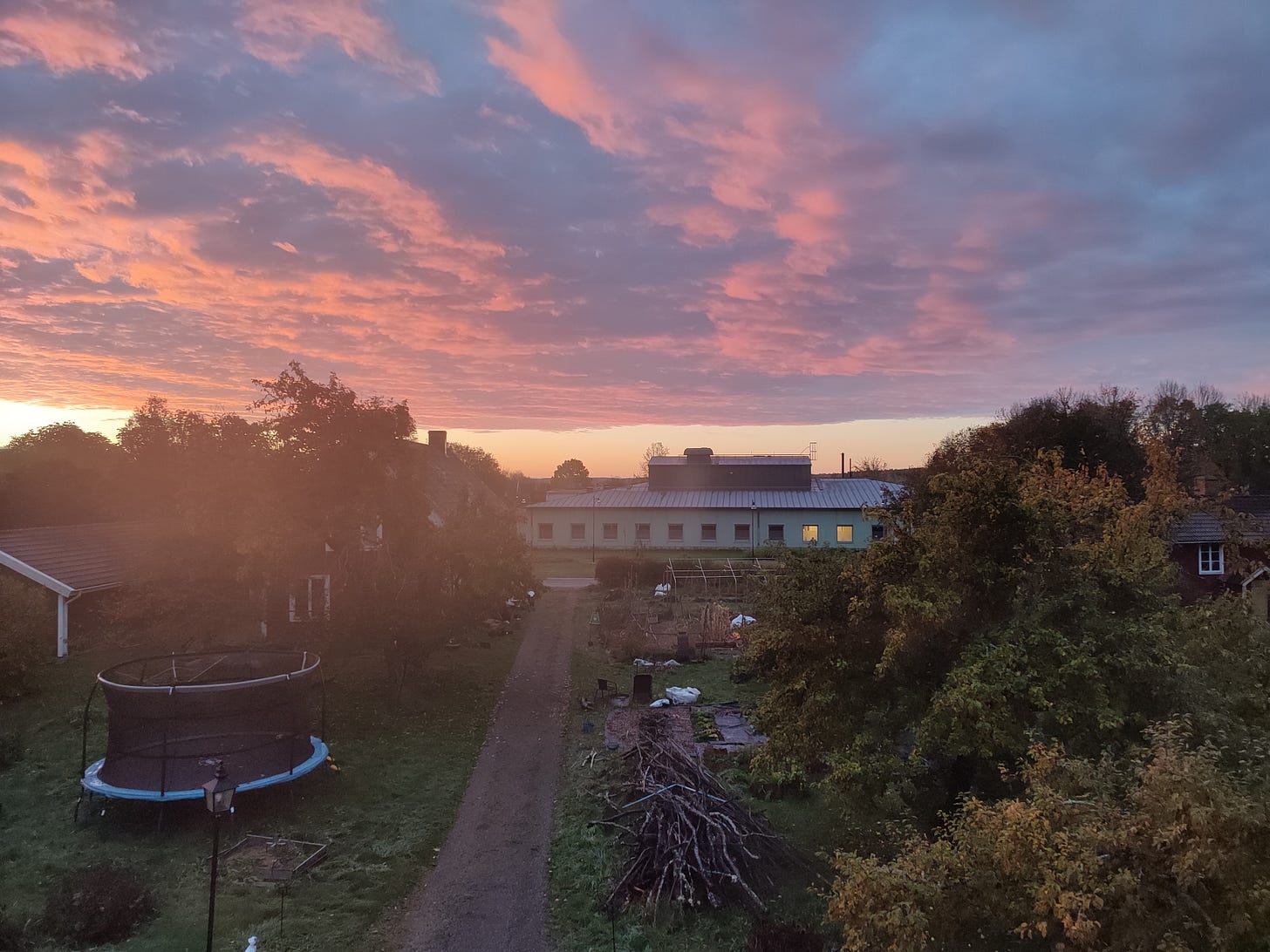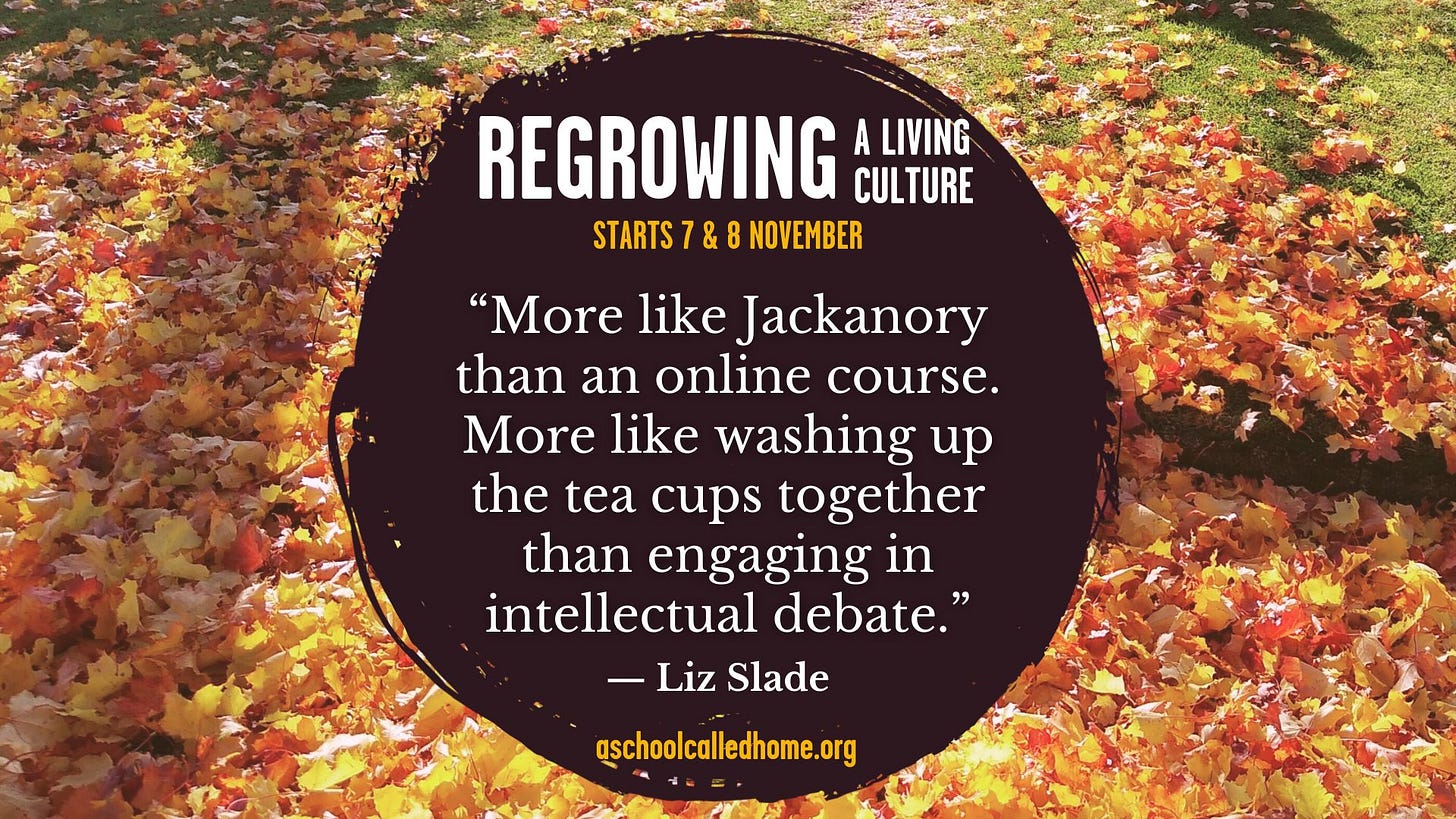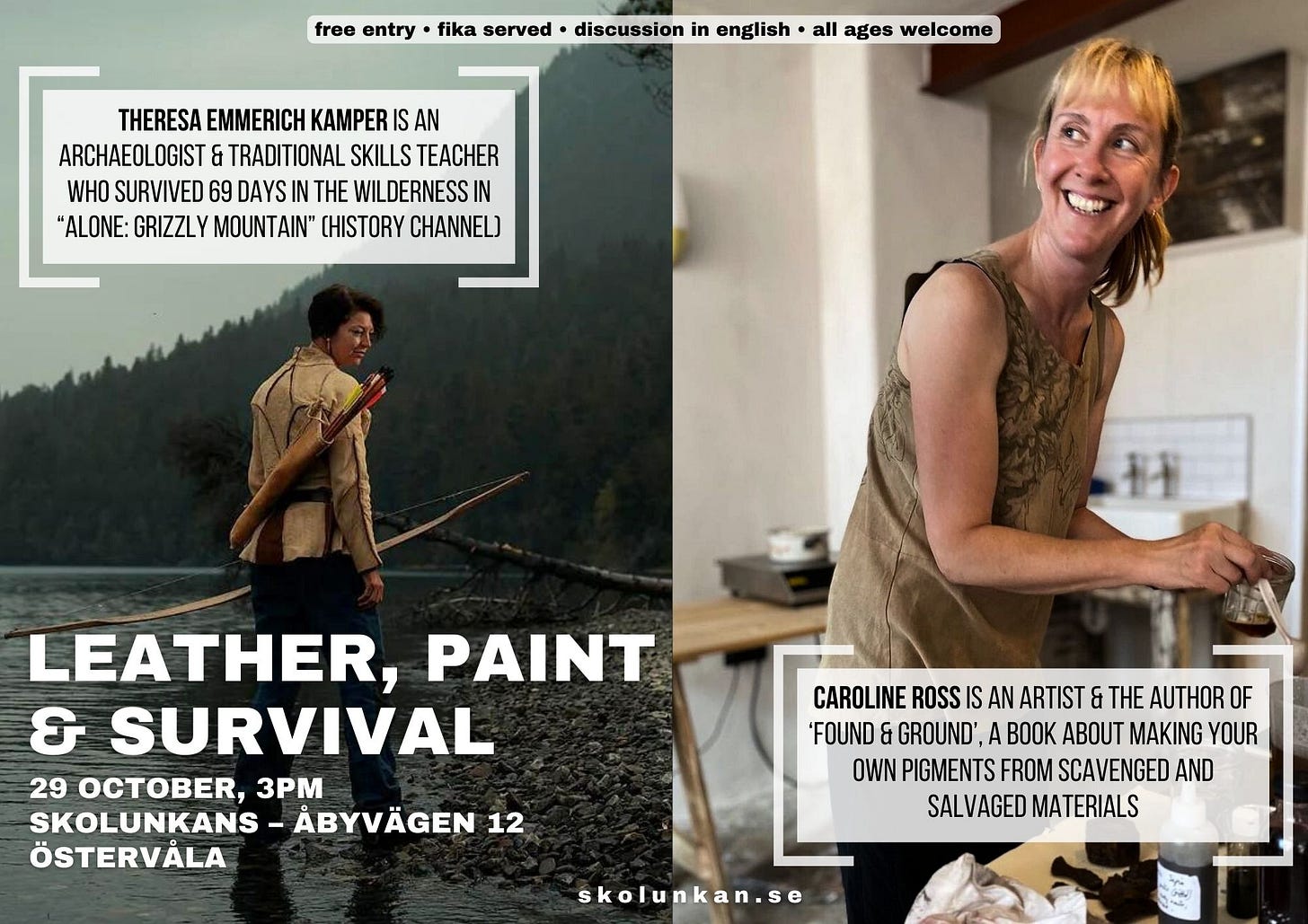Greetings from 60 degrees north. By the end of October, the days here will be two hours and forty-two minutes shorter than they were at the start of the month. The plunge into darkness is real.
Jay Springett told me last week, ‘You need to meet Richard Perkins, the regenerative agriculture guy… but of course he’s somewhere way up north.’ So I look him up and I’m like, ‘Fifty-nine degree permaculture? The guy’s a southerner!’
Seriously, though: Sweden, there’s just a lot of it. At least if you grew up with a European sense of scale. It’s as far from the north to the south as the distance from Stockholm to Rome, and Stockholm is already a third of the way up. There’s a phrase people use here, ‘Our oblong country’, which threw me at first, because I thought an oblong was a rectangle, but it turns out it’s any elongated shape, so bananas and cucumbers are oblong, and so is Sweden. And I suspect the geography goes a long way to explain this country’s quiet exceptionalism, the sense of being able to sit out the events of the wider world. ‘World War? We’ll give it a miss, thanks.’ ‘Lockdowns? Lycka till med det!’ There’s just always been a lot of forest to retreat into, until things calm down, and that mentality lingers. Even if most of the forest is mono-crop timber plantations these days.
Forgive me if I’m a little giddy today. You can blame the vertigo from the plunge into darkness, but there’s a lot swirling around just now. We’re expecting a flurry of visitors in the coming days, starting with Sam the Pirate who arrives tomorrow night, and then the amazing
and Theresa Emmerich Kamper (from TV’s Alone: Grizzly Mountain) who are going to do a show-and-tell in the old shoe shop on Sunday afternoon.On which note, let’s start with the announcements – and then maybe we’ll head deeper into the whirl of animism, theology and cosmology in which the little boat of my soul is adrift these days.
1. Regrowing a Living Culture
In two weeks’ time, this autumn’s online series at a school called HOME gets underway, and we still have places available, if you’d like to join me to explore the possibilities for ‘regrowing a living culture’.
Twice a year, Anna and I open up the work we’re doing with with an invitation to journey together for a few weeks. Somehow we stumbled into a way of using Zoom that creates pockets of hospitality and conviviality. You can sit back and listen, or lean in and get involved. What we find is that people come because they connected with something they read or heard me talk about, but stick around because of the connections they make with other participants, through the afterparty we have at the end of each session and the ongoing Long Table community which is open to anyone who has taken part in one of our series.
You can get a flavour of what happens from the words of some of our earlier participants.
of wrote in his latest post, ‘Dougald Hine has the distinction of teaching the only online course I’ve ever willingly signed up for, and I’m so glad I did.’And I think this is my favourite review yet, from
, chief officer of the Unitarian church:For those who didn’t grow up in the UK in the 1980s, Jackanory was story time on the BBC, a daily teatime show in which a well-loved actor read from a children’s book. When we do these series, I’m sitting in the storyteller’s seat, because it’s the most rewarding place to teach from – and although we gather around some heavy matters, our way of gathering is shaped by the conviction that hospitality and conviviality matter more than is generally recognised, when it comes to facing the darkness around and ahead. So the spirit of the conversations we bring together does have something in common with a really good chat at the kitchen sink.
All the details for the series are on the school website and we have two groups, meeting at different times of day to match most timezones, starting on 7 & 8 November.
2. The Illich Conversations
Earlier this month, I kicked off a round of conversations over Zoom with some other folks who share my love of the work of Ivan Illich, the great category-defying social thinker and critic of industrial society.
In the first of these, I was in conversation with Illich’s friend and co-conspirator, David Cayley. Here’s the recording for anyone who didn’t find it already:
There are three more conversations lined up, they take place fortnightly at 8pm UK time on a Sunday night. Those of you with a paid subscription to my Substack – or to
’s – are invited to join us on Zoom for the live session, including time for questions. The recordings are published later on YouTube.This Sunday’s session was due to be a conversation between me and Sam Ewell, author of Faith Seeking Conviviality – but for reasons we’ll come to in a moment, the schedule has been swapped around, so Sam will be speaking with David Cayley this Sunday, then I’ll pick up the baton two weeks later on Sunday 12 November, followed by an open discussion to wrap up the series on Sunday 26 November.
3. Leather, Paint & Survival
As regular readers know, I live above an old shoe shop. For three generations, it was run by the Lundqvist family, there’s still a sign outside that says LUNDQVISTS SKOR and it’s known to everyone around these parts as Skolunkans. So when we reopened it as an event space for our pocket-shaped school, that was obviously what it needed to be called.
We held our first public event in Skolunkans this July, when
and came to visit. Three months on, it’s the turn of and Theresa Emmerich Kamper. Because what could be more appropriate to a shoe shop than a leather worker? Two leather workers, of course!Theresa is a world-class tanner and traditional skills teacher, as well as a veteran of TV survival programmes Alone: Grizzly Mountain and Surviving the Stone Age. Caroline specialises in making pigments from foraged and scavenged materials, and generally recovering and reinventing techniques for making art without oil. On Sunday afternoon, the pair of them will be doing a show-and-tell in the shoe shop.
These Skolunkans events are where we bring our international collaborators together with our local community here in Östervåla. There’s no online version – but if you or someone you know happens to be within shouting distance, then you’re warmly welcome. We’re easy to get to from Uppsala by bus, there’ll be homemade fika from 3pm, the talk starts at 4pm and the rest of the details are on the Skolunkans site.
4. Annotations Livestream – today
Last week, I shared the invitation to a livestream event for
where I’ll be talking ‘cultural practice in a time of existential crisis’ with . That conversation should have happened yesterday, but it got put back 24 hours, which means you can join us in a few minutes’ time at 16.00 CEST, or catch up later on the Annotations YouTube channel. Either way, here’s the link you’ll need – and here are the notes on writing as practice that I wrote in response to Nico’s invitation.5. Talking Christianit(ies) on Rune Soup
Gordon White is one of my favourite podcasters and I started this week by sitting down at 9 o’clock on Monday morning for a conversation with him about how Illich’s life and work might help us navigate in the strange waters of the current resurgence of Christianit(ies). We go from nought to sixty in about five seconds here and barely pause for breath for the next hour and a half, so this is not so much Jackanory as some kind of spiritual-intellectual twist on Top Gear.
Whenever I point people Gordon’s way, I feel the need to add a ‘Your Mileage May Vary’, because I realise that everyone doesn’t enjoy the ride as much as I do. But I’m just going to quote the friend who wrote to me the other day: ‘I don’t always recognise what he sees, especially when he moves into big picture talk, but I enjoy his game regardless.’
Those of you following the Into the Deep essay series will find that I’m running ahead of the thread I’ve been tracing there in this conversation. There’s one more piece to come that will round off that series, before I widen out from this personal thread, to engage with the larger questions that Gordon and I got into.
Meanwhile, with uncanny timing, nestling alongside the link to that episode in my inbox this morning was this essay from Patrick Curry. He has some generous things to say about At Work in the Ruins, but what struck me here – and also in Patrick’s book, Art & Enchantment: How Wonder Works, which I’ve been reading – is an insistence on drawing a line between animism and monotheism, framing this as a fierce opposition. I actually find Patrick’s way of setting this out helpful, precisely because I don’t agree with his way of seeing things. We’ve been corresponding a little and I suspect that he may turn out to be a helpful conversation partner for thinking about these things.
But that’s a subject for another occasion. For now, I’ll just offer you this, from
’s latest post, where he’s writing about the messianic poem that begins in Isaiah 40, a poem ‘written to lift the spirits of a migrant community, displaced by war and looking for a way home’:This poem is full of language that powerfully diminishes the human story. ‘People are like grass… like flowers… they wither… they fade…’ This is all quite at odds with the anthropocentric worldview of modernity, which sees the world as a human story. Under modernity, nature is the word we use for everything besides ourselves; all the things that retreat into the thin margins. In this poem, however, the humans are like grasshoppers. God is associated with deep time and the vast material universe. The human story is small.
It would perhaps seem a little strange that this poem begins as a song of comfort. Is our smallness here comforting? These days I sense that more and more people really are taking comfort in the reality that the more-than-human world is vast and alive and resilient, and much bigger than we are. There is a surprising hope in the slow realisation that this human-centric world produced by the machinery of modernity, is a passing thing.
The whole piece is worth reading. It is a love letter to the deep.
I realised with a start that it will be a year on Saturday since I launched this Substack in earnest. I don’t intend to write one of those retrospective posts to mark the occasion, but let me take a moment now to say how grateful I am to have so many of you reading, sharing, engaging with and supporting my work. I have a sense of being part of a generative weave of readers and writers in whose company I feel somehow at home and out on an adventure, all at the same time. I suppose that fits with the ambiguity in calling this Writing Home.
Whilst this newsletter endorses a healthy scepticism towards ‘metrics’, the Substack dashboard informs me that, in its anniversary week, Writing Home has just crossed the threshold of a ‘Gross Annualized Revenue’ of $10,000. That represents a great deal of support and a significant contribution to my ability to make a living from my writing. So thank you to all those who have taken out paid subscriptions over the past year. It’s your support that has enabled me to put the writing I do here at the centre of my work in recent months.
I’m conscious that there are a few ‘founding subscribers’ with whom I have not yet had the promised one-to-one call, so if that’s you, then I’ll be in touch soon to find a time for us to speak.
And if you have been reading along over the past year and appreciating the journey my writing is taking, then maybe I can invite you to share this newsletter with someone else who you think would appreciate it.
Thanks, as always, for your support in all the forms it takes.
DH






Great Scott Dougald! Just finished listening to the Rune Soup conversation, it was spot on. Damit kann mann nichts machen, seems changed into now is the time. For me reading Jung’s Red Book made me realise how Christianity is in my fabric as well as in our whole society. He wanted to leave it behind but found that wasn’t possible. We must deal with that heritage.
Loved also the insight of not having the time to listen to each single individual sitting in the big circle. In stead we need collective ritual, ways to adres this that bypass the intellectual, the analytical, the endless talks. My journey of the last five years has been about gatherings and their primal function. I had a story idea for a novel about festivals. The research lead me deeper and deeper into the history and the function of celebrations and now I am publishing the results as a serial here on Substack. I believe it to be very timely.
I think the term shaman/philosopher could apply to my role. I am a non-academic and not an intellectual. I am what McGilchrist would call right hemisphere dominant. So, I do not have arguments for what I can clearly see. I only have story to convey the clarity.
Here is why I tell you this. The story is written except for the ending. I would love for you to play a role in that ending. A role in shaping it. In helping me to reach just that little further. How? By taking a bit of time to listen and reflect on my vision for this tale. I am asking several others to do the same during the coming year and my dream is that it will work as a ‘live’ event, as a gathering in its own right, and as a ritual of creation.
It can be in the form of a one on one Zoom conversation. No preparations needed.
While my newly painted forest floor right shoe dries I just read your piece. So many good things, and congrats on your successful year here. BTW, Theresa was actually on Alone Season 8, rather than Grizzly Mountain, although she did have bears...